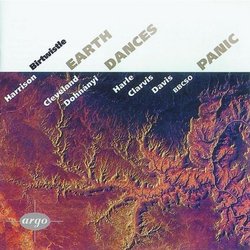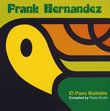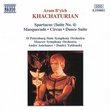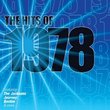| All Artists: H. Birtwistle, Christoph von Dohnányi, Cleveland Orchestra Title: Earth Dances/Panic Members Wishing: 0 Total Copies: 0 Label: Decca Special Imports Release Date: 5/24/1999 Genre: Classical Styles: Forms & Genres, Concertos Number of Discs: 1 SwapaCD Credits: 1 UPC: 028945210421 |
Search - H. Birtwistle, Christoph von Dohnányi, Cleveland Orchestra :: Earth Dances/Panic
 | H. Birtwistle, Christoph von Dohnányi, Cleveland Orchestra Earth Dances/Panic Genre: Classical
|
Larger Image |
CD DetailsSimilar CDs
|
CD ReviewsDifficult but rewarding music beautifully presented Discophage | 08/22/1999 (5 out of 5 stars) "Birtwistle's PANIC, almost jazzy at times, is obviously meant to be more immediately accessible to a general audience. EARTH DANCES is more cerebral and requires more effort from the listener. You need to read the album notes and listen to the piece a few times before you start getting into it. The effort is worth it, though." Essential Birtwistle peer gynt | Northern Ireland | 07/13/2003 (4 out of 5 stars) "Panic caused a scandal at its premiere at The Last Night of the Proms a few years ago. Some disgruntled readers of the British 'Radio Times' questioned whether this actually could be called music. Intrigued and not having heard the first performance, I bought this cd enthusiatically...However, it appears I had been taken in by a deeply traditional Last Night of the Proms audience; Panic is a deeply musical piece, orgiastic, primitive, unrelenting, yet suave, inflected with jazz and accessible.The title is a pun on Pan, the Greek half-goat demi-god, and the whole work is a primal yet sophisticated goat dance played with swing by saxophonist John Harle with orchestral support plus jazz kit. Earth Dances is a monumental orchestral work of interlocking rhythmic structures, full of heavy brass and low register rumblings. The Earth itself is dancing and its movements are slow, massive and momentous. At around 37 minutes, this is long for a single movement, but Birtwistle seems to create a timeless atmosphere in his depiction of elemental forces.I recommend this cd highly to all listeners interested in the most important English composer of his generation and to those new to Birtwistle, as this release amply demonstrates his originality, power and two of his artistic preoccupations: ancient Greece and nature.The playing on both works is excellent but my one quibble is the balance of the recording of Earth Dances. Whilst I appreciate the problems in balancing the huge orchestral forces, the trombones and drums feel a little too distant and one loses a certain directness of attack in the echoey acoustic.All in all, though, a great release." Some reasons for the white-livered to panic, indeed Discophage | France | 09/07/2008 (5 out of 5 stars) ""Panic", Birtwistle's Saxophone Concerto, was met with a gigantic uproar when it was premiered on the Last Night of the Proms on September 16, 1995 - the first piece of contemporary music ever to have appeared on that occasion - and broadcast to an audience of millions of viewers on the BBC 1. No wonder. Imagine the wildest and most piercing solos of free Jazz Saxophone and add to that a violently pounding and seemingly cacophonous large symphony orchestra, and you'll get something like Panic. The piece is conceived as an evocation of the God Pan (or Dyonisus), and the words of the English poet from the Victorian era Elizabeth Barrett Browning that preface the score are telling: "What was he doing, the great god Pan, Down in the reeds by the river? Spreading ruin and scattering ban, Splashing and paddling with hoofs of a goat, And breaking the golden lilies afloat With the dragon-fly on the river." As with about all the music of Birtwistle, it is forbidding, rugged, aggressive, not seductive, but unquestionably impressive. There were good reasons for the unprepared public of that Last Night of the Proms to panic, indeed. So be prepared.
Completed in 1986, "Earth Dances" signalled the composer's return to writing for the large symphony orchestra, 14 years after his "Triumph of Time" (1972) which first brought him to wider public attention. In Earth Dances, he developed and brought a few steps further some compositional processes first essayed in his piece for ensemble Secret Theatre from 1984. He divides the orchestra in six different groups, assembled by instrumental register (violins and upper winds, lower strings and brass etc. - although there are shifts of instruments between the different groups), each assigned a different layer or "stratum" of material, some linear and melodic, some vertical (which I assume refers to chordal pounding). Theses six strata aren't present continuously but appear and reappear, come to the fore and fade into the background. It is the shifting relationships of the strata that generate the work's prodigious and often violent surface energy - making the Earth "dance". The piece exemplifies Birtwistle's fascination with the musical piece as an "object" to be considered from different vantage points, as a rock or crystal observed from different angles, rather (re the notes) than the "organic", goal-directed linearity of traditional Western music. "Earth Dances" is massive, menacing, forbidding, eliciting a sense of awesome power, at times pent-up, at times unleashed. As its title implies, It evokes the massive telluric processes that have shaped and reshaped the earth's surface ever since the formation of the planet. Again, the music is impressive rather than seductive. Although there are melodic lines (thorny and tormented), the piece is less about melody than about violence, matter, processes. Dohnanyi's sonics are much more present and vivid than those afforded to the premiere recording, by the BBC SO under Peter Eötvös (Birtwistle: Earth Dances), and the orchestra has more bite. In 2004 DG released another version on their 20/21 series (making it one of the composer's most recorded pieces), with the Ensemble Modern Orchestra conducted by Boulez, and for reasons unknown it took four years to get a listing on this website: Birtwistle: Theseus Game, Earth Dances. I'll review it soon. Excellent notes. TT 55:20. This disc has been reissued , complemented with the composer's Trumpet Concerto "Endless Parade" (Endless Parade: Trumpet Concertos by Birtwistle / Maxwell Davies / Blake Watkins) and with Boulez' DG disc of pieces for ensemble (Harrison Birtwistle: Secret Theater / Tragoedia / Five Distances / Three Settings of Celan - Pierre Boulez / Ensemble InterContemporain), on a convenient 2 CD set from Decca's British Music Collection (The British Music Collection: Harrison Birtwistle). " |

 Track Listings (2) - Disc #1
Track Listings (2) - Disc #1



